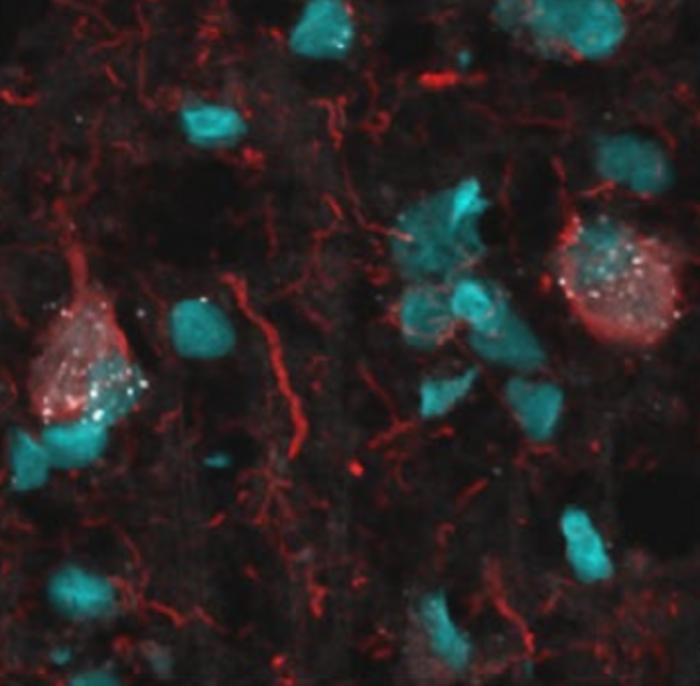Alzheimer’s disease, a leading cause of dementia in the United States, affects millions of individuals, causing profound cognitive impairment. In the quest for effective treatments, scientists have primarily focused on addressing beta-amyloid plaques, a hallmark of Alzheimer’s. However, recent drug developments targeting these plaques have shown limited success.
Now, researchers at Wake Forest University School of Medicine are shedding light on a different avenue of research: cellular senescence. Senescent cells are aged, malfunctioning cells that don’t undergo proper repair processes and linger in the body, releasing harmful substances that damage healthy cells and promote inflammation. These cells play a role in the aging process, neurocognitive decline, and even cancer.

CREDIT: Nature Medicine
In 2018, Dr. Miranda Orr and her team discovered evidence of senescent cells in human Alzheimer’s disease and observed their contribution to brain cell loss, inflammation, and memory problems in mouse models.
To address this issue, researchers repurposed an FDA-approved drug designed to eliminate cancer cells (dasatinib) and combined it with a plant-derived antioxidant (quercetin). This combination had previously demonstrated its ability to target and eliminate senescent cells in Alzheimer’s mouse models while being safe for patients with other ailments.
In their recent study, co-led by Dr. Mitzi Gonzales of The University of Texas Health Science Center at San Antonio, researchers enrolled five participants aged 65 and older who displayed early-stage Alzheimer’s symptoms. These participants received oral dasatinib and quercetin over two consecutive days, followed by a two-week drug-free period. This cycle was repeated six times over a total of 12 weeks.
The primary objective was to determine whether these drugs could penetrate the central nervous system. To assess this, the research team collected cerebrospinal fluid (CSF) samples before the first dose and after the final dose. They also monitored side effects, evaluated senescence biomarkers in CSF and blood, and assessed participants’ cognition and brain images before and after the 12-week study.
Results showed increased levels of dasatinib and quercetin in the blood, with dasatinib detected in the CSF of four subjects, though quercetin was not found in any participants’ CSF. Importantly, the treatment was deemed safe, feasible, and well-tolerated, with no significant changes in brain function, including memory.
Additionally, the combination therapy seemed to clear amyloid from the brain and reduce inflammation in the blood, although these findings require cautious interpretation due to the small study size and the absence of a placebo group.
Researchers did note an increase in inflammation in CSF biomarkers, potentially related to the clearance of senescent cells or inflammation associated with the treatment itself. Further monitoring is necessary in subsequent trials.
Dr. Orr’s research is a pivotal step in Alzheimer’s research, shifting the focus from traditional hallmarks like amyloid and tau to the biology of aging. As aging is the primary risk factor for Alzheimer’s, novel approaches such as senolytics are gaining importance. The larger $3 million Phase II clinical trial funded by the Alzheimer’s Drug Discovery Foundation will provide more insights into the effects of clearing senescent cells.
This promising research suggests that tackling cellular senescence could hold the key to innovative Alzheimer’s treatments, offering hope to millions of patients affected by this devastating disease.
1. What are the 7 stages of Alzheimer’s?
Alzheimer’s disease typically progresses through seven stages, each with its own set of symptoms and challenges. These stages help in understanding the evolving nature of the disease:
- Stage 1: No Impairment: In this early stage, there are no apparent symptoms or memory issues.
- Stage 2: Very Mild Decline: Individuals may start experiencing minor memory lapses, often attributed to normal aging.
- Stage 3: Mild Decline: Memory problems become more noticeable, including difficulty recalling names and recent events.
- Stage 4: Moderate Decline: This stage involves a clear cognitive decline, with individuals struggling with tasks like managing finances and remembering recent events.
- Stage 5: Moderately Severe Decline: Daily activities become challenging, and assistance may be required for tasks like dressing and personal hygiene.
- Stage 6: Severe Decline: Individuals may lose awareness of their surroundings, face personality changes, and require constant supervision.
- Stage 7: Very Severe Decline: In the final stage, communication becomes extremely limited, and individuals lose the ability to walk, sit, or even swallow.
2. What are the 5 warning signs of Alzheimer’s disease?
Recognizing early warning signs of Alzheimer’s is crucial for early diagnosis and intervention. Here are five common indicators:
- Memory Loss: Frequent forgetfulness, especially of recently learned information.
- Difficulty Solving Problems: Struggling with tasks that involve planning, concentration, and problem-solving.
- Confusion with Time or Place: Losing track of dates, seasons, or locations.
- Challenges with Familiar Tasks: Finding it hard to complete daily tasks, like cooking a meal or managing finances.
- Changes in Mood and Personality: Noticeable shifts in mood, such as increased irritability, anxiety, or withdrawal from social activities.
3. How do Alzheimer’s patients cope?
Coping with Alzheimer’s disease can be challenging, both for patients and their caregivers. Here are some strategies for patients to manage the condition:
- Medication: Consult with a healthcare professional for medications that may help slow down cognitive decline.
- Supportive Environment: Creating a safe and familiar living space can reduce confusion and anxiety.
- Engaging Activities: Stimulating activities like puzzles, music, and art can help maintain cognitive function.
- Healthy Lifestyle: A balanced diet, regular exercise, and social engagement can improve overall well-being.
- Caregiver Support: Caregivers should seek support and respite to prevent burnout.
4. What’s the difference between Alzheimer’s and dementia?
Alzheimer’s disease and dementia are related but distinct terms:
- Alzheimer’s Disease: Alzheimer’s is a specific neurodegenerative disease that primarily affects memory and cognitive functions. It is one of the leading causes of dementia.
- Dementia: Dementia is an umbrella term for a set of cognitive impairments that impact daily life. Alzheimer’s is a type of dementia, but there are other forms, such as vascular dementia and frontotemporal dementia.
In summary, understanding the stages of Alzheimer’s, recognizing warning signs, adopting coping strategies, and distinguishing Alzheimer’s from dementia are all important aspects of managing this challenging condition. Early detection and appropriate care can make a significant difference in the quality of life for individuals and their families.











